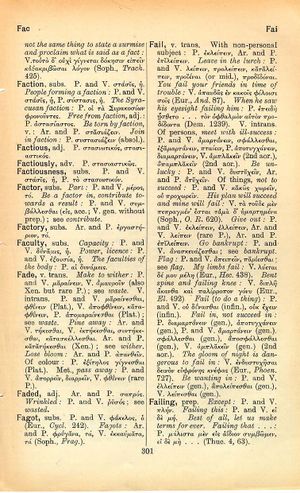fade
Θεὸν προτίμα, δεύτερον δὲ τοὺς γονεῖς → Post deum habeas parentes proximo loco → Vor allem ehre Gott, die Eltern gleich nach ihm
English > Greek (Woodhouse)
v. trans.
Make to wither: P. and V. μαραίνειν, V. ἀμαυροῦν (also Xen. but rare P.); see waste. V. intrans. P. and V. μαραίνεσθαι, φθίνειν (Plat.), V. ἀποφθίνειν, καταφθίνειν, P. ἀπομαραίνεσθαι (Plat.); see waste. Pine away: Ar. and V. τήκεσθαι, V. ἐκτήκεσθαι, συντήκεσθαι, κατασκέλλεσθαι. Ar. and P. κατατήκεσθαι (Xen.); see wither. Lose bloom: Ar. and P. ἀπανθεῖν. Of colour: P. ἐξίτηλος γίγνεσθαι (Plat.). Met., pass away: P. and V. ἀπορρεῖν, διαρρεῖν, V. φθίνειν (rare P.).
German > Latin
fade, insulsus. infacetus od. inficetus (ohne Geist u. Witz). – frigidus (ohne Geist u. Leben, z.B. negotia). – inanis (leer, gehaltlos, z.B. reprehensio); verb. frigidus et inanis. – fades Zeug, res insulsae, infacetae od. inficetae; insulsa(n. pl.):infaceta od. inficeta(n. pl);frigida(n. pl.);inania(n. pl.);frigida et inania(n. pl.). – Adv.infacete od. inficete; frigide.

